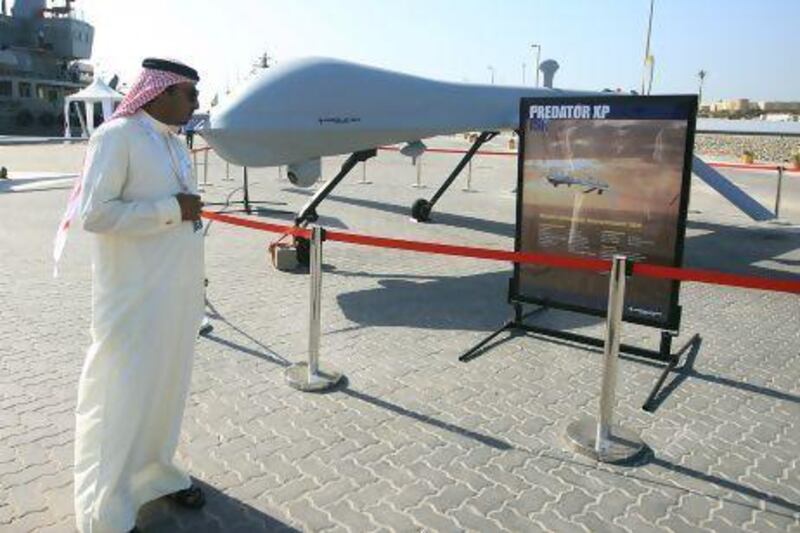NEW YORK // With the recent lifting of restrictions on US firms selling drones to countries in the Middle East, demand from the region is surging.
The UAE's recent US$200 million (Dh734.6m) purchase of unarmed Predator drones underscores the importance nations now place on the technology. But as the interest in what many perceive to be the most important military tool of the future goes global, its use is drawing criticism from across the political spectrum in the United States, and even from former military commanders, over legal, ethical and strategic concerns.
The issue has come increasingly into focus in recent weeks. First came the unprecedented scrutiny by Congress into the Obama administration's oversight mechanism in the covert drone war against suspected terrorists in Yemen and Pakistan at the confirmation hearing this month of the nominee for CIA director, John Brennan.
President Barack Obama told the Senate intelligence committee that he would allow them to see the confidential legal memos that lay out the legal basis for the strikes, especially against US citizens who have been charged with no crime. But he has so far failed to deliver and the confirmation vote has been delayed in Congress.
The conservative Republican congressman Rand Paul last week threatened to filibuster the vote, saying that Mr Brennan had dodged a question about whether he would authorise a drone strike against a citizen on US soil without judicial review.
"It opens Pandora's box once you say you may well kill Americans in America without any judicial trial, with politicians making the decision," Mr Paul told CNN. "That's very worrisome."
As a compromise, some legislators have called for a secret court to provide a check on the president's power to carry out secret assassinations.
But the compromise is unlikely to dampen the growing calls for transparency, with critics saying such a court would be little more than a rubber stamp. "No one has talked about passing legislation putting any real restrictions on what the executive can do," said Marcy Wheeler, a Michigan-based writer political blogger and civil liberties advocate. "So I don't know what the court would be ruling on."
Other concerns about drone strikes centre on the over-estimation of their strategic value. Stanley McChrystal, the retired general who pioneered covert "kill/capture" operations in Iraq and Afghanistan, said in an interview with Foreign Affairs this week, "if you go back in history, I can't find a covert fix that solved a problem long term".
The Obama administration, buffeted by the crises in the Middle East, decided that Yemen was "just too hard to do", said Gregory D Johnsen, author of The Last Refuge: Yemen, Al Qaeda and America's War in Arabia. "Instead of working to get a permanent solution the US decided that if they can fire enough missiles and keep Al Qaeda from plotting against it, that is a win. I don't think that is a sustainable policy."
Drone technology can seduce political and military leaders with its ability to eliminate risk to US lives. But without a parallel focus on on-the-ground human intelligence, the strikes are less effective and often hit the wrong target and kill civilians, which can benefit terrorist groups.
"The US just does not have very good human intelligence capabilities in a place like Yemen, and I think that's born out in the mistaken strikes it carries out as well as the growing number of Al Qaeda fighters there," said Mr Johnsen.
"No one has been able to draw a line for the cause and effect of when the US does this; it is creating more of a national security threat down the line," he said, adding that Al Qaeda in the Arabian Peninsula has at least tripled in size since the US stepped up targeted strikes in Yemen.
The calls for more oversight on the use of drones abroad coincided with increasing unease and even protest over the technology being used by domestic law enforcement, as there is a legal grey area around its ability to collect and store data from drones.
A poll by the Monmouth University in New Jersey last June, well before the current focus, found that 64 per cent of Americans would be "very concerned" about their privacy if law enforcement began using drones, though most supported domestic drone use in some situations, such as search and rescue (80 per cent) or tracking fugitives (67 per cent).
After a heated city council meeting last week, the Seattle police department returned two unused drones to the manufacturer and cancelled its drone programme. Days earlier, Charlottesville, Virginia became the first city to restrict its police from using evidence obtained by drones in criminal cases.
"It's clear that drones are here to stay and are only going to become more sophisticated," said Rebecca Jeschke, an analyst with the Electronic Frontiers Foundation, a California-based non-profit that advocates for privacy rights.
"Now is the time to take a closer look at what's going on and where, so we can talk about what the appropriate policies are," she added.
Legislation to prevent police from using drones to conduct surveillance without probable cause has been proposed in at least 13 state legislatures around the country, according to the American Civil Liberties Union.
tkhan@thenational.ae





